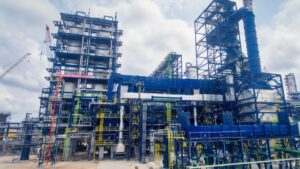
NIPCO embarks on business expansion to aid diversification, others
The Nigerian Independent Petroleum Company (NIPCO), says it has intensified investment in gas infrastructure to aid diversification and Nigeria’s energy transition.
The Managing Director, NIPCO Plc, Mr Suresh Kumar who said this during a facility tour of the company on Sunday in Lagos, added that it would also reduce the country’s dependence on fossil fuels.
Kumar said that the organisation had deepened gas usage and market penetration in the country through massive investment in the sector.
He said that as the Federal Government plans to put an end to fuel subsidy, natural gas by Compressed Natural Gas (CNG) and Auto CNG were bound to be a preferred “fuel of choice.”
According to him, the benefits of the natural gas is that it is safe, environmental friendly, economical, among others.
Kumar said that the company had invested massively in gas infrastructure, in line with Federal Government declaration of 2021 to 2030 as “Nigeria’s Decade of Gas.”
He noted that the declaration is a period the government aspired to accelerate domestic and export gas production and utilisation.
He said that NIPCO is intensifing investment in gas infrastructure to bolster the gas agenda of the Federal Government, which is getting a booster.
According to him, already, the company has established Compressed Natural Gas (CNG) facilities across the country to make cars run on gas.
He added that NIPCO had been expanding its scope on supply of Liquefied Natural Gas (LNG) and constructing new pipeline infrastructure to strategic locations in the country.
Kumar, said the company had invested over $50 million in developing Nigeria’s natural gas over the years, while more projects were still in the offing.
He said,“We have spent more than $50 million on natural gas infrastructure over the years. We believe that there are lots of potential in Nigeria that can be explored for gas utilisation, and this will further boost our economy.
“By using indigenous gas, we can reduce subsidy burden on the Federal Government.
“We can also reduce the importation burden and that will directly or indirectly reduce capital flight and create more employment opportunities for Nigerians.
“We are the pioneers. We always dream for the future. So, we dreamt for natural gas utilisation in Nigeria right from 2008 and we started investing.
“We introduced this model to the government. Nigeria is a country that has abundant natural gas and instead of wasting subsidy on petrol, we should be looking at a blueprint that can change the petrol market to CNG market,” he said.
According to him, NIPCO is an integrated company that supplies Nigerian market with petrol, diesel and gas.
Kamar said the company currently has about 19,500 metric tonnes combined storage capacity for LPG with 10 loading bays, which could truck-out over 4,000 tons per day.
Also speaking, Managing Director, NIPCO Gas, Mr Nagendra Verma, said the company currently has 14 CNG filling stations in various states across Nigeria and another six CNG stations, currently under construction.
He said over 7,000 vehicles were currently running on CNG, adding that over 350 truck fleet belonging to NIPCO were all on gas.
We have workshops which are fully efficient and fully capable to convert PMS vehicles to gas, we have the expertise and we are ready to convert more vehicles to run on gas, he said.
Verma said, “So, we intend to have CNG stations in almost all the states of Nigeria, wherever the pipeline is available.
“Presently, we are laying LNG pipeline for 80 Kilometer pipeline from Shagamu interchange to Ibadan.
“The pipeline work is going on. We expect to commission first phase by the end of December 2023.
“And the entire pipeline is expected to be completed by next year.”
According to him, the company is also developing gas pipeline infrastructure in Lekki Free Trade Zone in Lagos, which is currently nearing completion.
He said the company is currently constructing a propane tank of 500 metric tonnes capacity, the biggest in Nigeria, in a bid to meet up with the Federal Government requirements of mixing certain quantity of propane with butane for domestic gas.
Verma said that the propane tank would be completed in the next three months.



